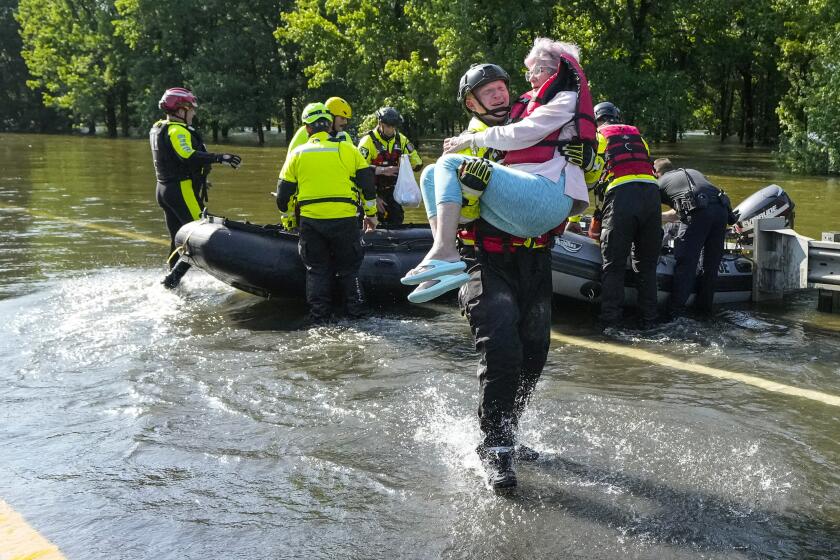Rape Case Furor Provokes Legal Review by U.S., Japan : Diplomacy: Tokyo wants custody of three GIs accused of assaulting a Japanese girl, 12.
Amid an escalating national furor over the alleged rape of a 12-year-old Japanese schoolgirl by three U.S. servicemen, the United States and Japan agreed Thursday to review special legal procedures for U.S. military personnel charged with crimes here.
However, in a meeting with Foreign Minister Yohei Kono, U.S. Ambassador Walter F. Mondale made clear that the United States will not revise the agreement granting those privileges, as a growing number of Japanese are demanding.
The bilateral Status of Forces Agreement gives the U.S. military custody of personnel accused of committing crimes off base until they are indicted by local authorities. Japanese officials are now asking for immediate custody of the suspects, to which they are entitled in cases involving non-military personnel--Japanese and foreign.
“They should be handed over to us, first of all,” Prime Minister Tomiichi Murayama told Kyodo News Service.
The alleged rape near a U.S. base has fueled heated media coverage, provoked threats of violence against Americans here and could cloud a planned summit between Murayama and President Clinton in November.
But Clinton said Thursday that he does not believe U.S.-Japanese ties will be jeopardized by anger and controversy over the incident.
In a radio interview, the President said he was “outraged” by the crime and will “make it clear that the United States deeply regrets the incident.”
He emphasized that the two nations have long enjoyed good relations, except on some trade disputes, and said he expects that relationship to continue.
Rapes and other violent crimes have occurred before near U.S. bases in Japan--more than 230 since 1980, according to police records. But public outrage over the current case is unrivaled in the 35 years since the agreement took effect.
Analysts attribute the fierce public outcry to several factors: the heinousness of the crime, sharp media criticism over perceived special treatment of U.S. military suspects and the growing willingness here to question the U.S.-Japan Security Treaty in the post-Cold War world.
*
On Sept. 4, three servicemen in Okinawa prefecture allegedly abducted an elementary-school girl on her way home from a grocery store. They allegedly bound her with adhesive tape and raped her on an isolated beach.
The suspects--Marine Pfc. Rodrico Harp, 21, of Griffin, Ga., Pfc. Kendrick M. Ledet, 20, of Waycross, Ga., and Navy Seaman Marcus D. Gill, 22, of Woodville, Tex.--are in custody at a U.S. base. American authorities are turning them over to Japanese police for interrogations that last up to nine hours a day, but the Japanese are pushing for more access.
On Thursday, Mondale apologized to Kono after making a similar apology to Okinawa Gov. Masahide Ota on Tuesday. “It is outrageous, inexcusable,” Mondale said. “We are ashamed, and we apologize.”
In an effort to quell public criticism that Japanese investigators are not being given ample time for interrogation, Mondale said the suspects will be made available “any time--in the middle of the night, on weekends or on holidays,” according to a Foreign Ministry official at the Thursday meeting.
*
In Okinawa, tensions are running high. In a meeting Wednesday with Kono, several members of the Okinawa Prefectural Assembly demanded a revision of the U.S. Status of Forces Agreement and a reduction of U.S. troops. Currently, 75% of all American troops in Japan are stationed on Okinawa--about 29,000 of them--making it the most important U.S. military outpost in the Pacific.
Lt. Tania Dutko, a spokeswoman for Kadena Air Base in central Okinawa, confirmed that threats had been made against troops there. One anonymous caller claimed he had planted a bomb on a U.S. military school bus. No bomb was found.
The Okinawa Peace Movement Center has called for a rally against the U.S. military presence there, to be held Tuesday. More than 3,000 people are expected to participate.
Okinawa was an independent kingdom until it was annexed by the Japanese in the late 19th Century. Many Okinawans feel they are regarded as second-class citizens and that their complaints about the U.S. military presence are ignored by Tokyo. One man interviewed on Japanese television described the Okinawa bases as a modern-day form of colonialism.
The alleged rape could cast a pall on the planned November summit between Clinton and Murayama, which was expected to highlight the importance of the U.S.-Japan Security Treaty.
However, the Daily Yomiuri newspaper quoted a Japanese Foreign Ministry official as saying the government would stand firm against any tampering with the treaty. To do otherwise, the official said, would open the door for the U.S. Congress to increase demands that Japan pay a larger share of the cost of keeping U.S. troops there.
* Times staff writer John M. Broder, traveling with President Clinton in California, contributed to this story.
More to Read
Start your day right
Sign up for Essential California for news, features and recommendations from the L.A. Times and beyond in your inbox six days a week.
You may occasionally receive promotional content from the Los Angeles Times.






